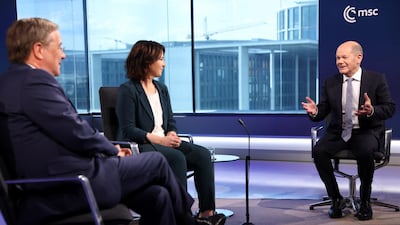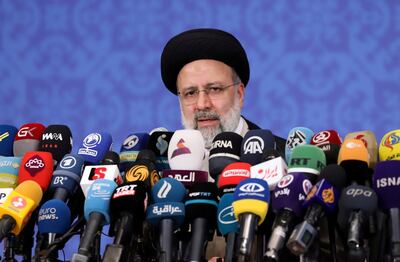The election of Ebrahim Raisi as president of Iran received a gloomy reception from candidates running to be Germany’s next chancellor.
Olaf Scholz, Germany's Finance Minister and the Social Democratic candidate, said talks to revive the nuclear deal with Iran were about to become more difficult.
Rival candidate Armin Laschet, who is running for Ms Merkel’s conservative bloc, blamed the election result in Iran on the failure of US sanctions and “maximum pressure” policies against Tehran.
“The hardliner has just been elected. That is the consequence after four years,” he said at a debate on foreign policy.
Asked whether he would invite Mr Raisi to Germany, Mr Laschet said: “A visit by the Iranian president is really not on the agenda at the moment.”
Germany is one of the signatories to the Iran nuclear deal, which was drawn up in 2015 with the aim of preventing Tehran from developing a nuclear weapon.
Former US president Donald Trump pulled Washington out of the deal in 2018 and reimposed sanctions on Iran, which responded by breaching the limits on nuclear activity that it agreed to under the pact.
Talks on a possible US return to the deal have been running in Vienna since April.
“It is a laborious process and it’s now going to get more laborious in light of the elections that have taken place,” Mr Scholz said.
“But the fact that it is so hard and laborious does not change the fact that this is very perilous for Israel, the Middle East and Europe.
“We have to hang in there and try to get something good out of it and we hope that we will be able to achieve something with the new US government, despite the gloomy prospects which I don’t think can be sugar-coated.”
Mr Laschet said it was right to persist with the negotiations, in which Iran is demanding that all sanctions be lifted before it resumes compliance.
“President Trump deployed the toughest measures against Iran over the past four years, left the deal, imposed sanctions – with absolutely no result,” he said. “The hard line clearly achieves nothing.”
Green Party candidate Annalena Baerbock was not called to speak on Iran but her party supports the revival of the nuclear deal.
Russia dispute
Ms Baerbock staked out tougher lines than her rivals on China and renewed her opposition to the Nord Stream 2 gas pipeline amid concerns over Russia.
Russian gas company Gazprom and its Western partners have completed 95 per cent of the pipeline to send natural gas under the Baltic Sea.
Washington opposes the project, which it fears will give too much leverage to Russian President Vladimir Putin but Mr Laschet echoed Mrs Merkel’s stance by saying it should be finished.
If Russia used it as a geopolitical tool against Ukraine, the gas flow through the pipeline could be stopped, he said.
But Ms Baerbock rejected this. “Imagine a winter in Europe – we won’t be able to switch off Nord Stream 2, because then we Europeans won’t have any gas at that moment,” she said.
“My opinion is that we cannot speak about European sovereignty but then duck away at the crucial moment and say it is a purely economic project.”
After a rocky start as party leader, Mr Laschet is now ahead in the polls while Ms Baerbock has slipped in recent months.
Mr Scholz’s Social Democrats, who are currently in coalition with Mrs Merkel’s conservatives, are third in the polls. Germans will vote on September 26.



